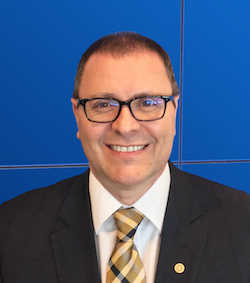Always keep learning: Victor Pellegrino (MBA’06)
Written by Miriam Breslow
Earning an MBA degree mid-career was not on Victor Pellegrino’s  (MBA’06) radar when he began an undergraduate degree in ancient history. The Montreal-born banking executive was, at that point, a young McGill student who happened to have diverse interests, including math, science—and business. After graduation, when an opportunity arose to work in customer service at the Bank of Montreal, Pellegrino took it. The year was 1986.
(MBA’06) radar when he began an undergraduate degree in ancient history. The Montreal-born banking executive was, at that point, a young McGill student who happened to have diverse interests, including math, science—and business. After graduation, when an opportunity arose to work in customer service at the Bank of Montreal, Pellegrino took it. The year was 1986.
“I didn’t know much about banking so I began to educate myself,” recalls Pellegrino. He quickly learned that the industry was more diverse than he’d imagined. “People think of banking as the branch network, tellers and lenders, but it’s much more complex than that,” he says. BMO also offered educational opportunities: “The bank has an Institute of Learning that’s like a university environment and allows us to hone our skills,” he explains. Pellegrino’s penchant for educating himself, making himself “more marketable” and seizing opportunities led him through several roles. In the early 1990s, he became an account manager; by the late 1990s he was named to a leadership role. Then, in 2002, something happened that he wasn’t expecting: BMO sent him back to school.
“BMO was running an integrated program with Dal, and I was asked if I would be open to joining the team and doing my MBA at Dalhousie in Financial Services,” Pellegrino explains. He had doubts at first: “I had been out of school for a while. I was in my early forties and I said, ‘Jeez, do I want to do this?’” he recalls. “But I was flattered to be asked.” Pellegrino had hands-on experience, but hadn’t explored his industry in a classroom setting. “It was an opportunity for me to develop my skill set and to further my goal of becoming an executive.”
Pellegrino was living in Montreal. Like the MBA (Financial Services) instructors, he flew to Toronto for the lectures at BMO’s Institute for Learning; for the intensive sessions that finished each course, the BMO group traveled to Halifax. “You learn how to manage your time,” says Pellegrino, “because you’re also still working, running your area full-time.” Despite the challenging schedule, Pellegrino enjoyed his courses, especially International Business and Management. “They added to my skill set and gave me immediate advantage in my everyday interactions at work,” he says.
Student diversity makes the MBA at Dalhousie (FS) program invaluable in Pellegrino’s eyes. “What I loved most was the exchange that resulted from bringing people together from different backgrounds and cultures,” he says. “You expand your horizon with diversity around the table. It was different from the classroom experience I’d had in my undergrad. What I learned in the MBA (FS) I’ve applied to my career later.” These skill sets involve leveraging the abilities of a team, explains Pellegrino, something he strongly believes in. And the other side of that coin, he says, is learning not to jump to conclusions: “You learn to step back and weigh things,” says Pellegrino, “how to listen carefully and value people’s opinions. It’s so important not to rush to solutions—if we do that we probably haven’t spent nearly enough time identifying what the problem is.”
On the day he received his MBA, Pellegrino learned that he was to become an executive at BMO. “October 28, 2006,” he recalls. “I was named Commercial Vice-President for the island of Montreal.”
While he had reached a major goal, Pellegrino did not stop there. He has since taken on progressively senior roles at BMO. After a recent short stay in Halifax as Senior Vice-President Atlantic Canada, he moved to Ottawa to become Senior VP Eastern and Central Ontario. “I oversee the branch network as well as commercial banking,” he explains, “with about 1,000 employees under my leadership.” Pellegrino is one of only eight BMO Senior VPs in Canada. “I am where I want to be in terms of career development,” he says. “But I would most certainly welcome a return to Atlantic Canada.”
Pellegrino and his family loved Halifax, he says, and he still feels a strong link with Dalhousie. Through his intensives as well as discussion with faculty and students, he has realized that the Rowe School of Business MBA at Dalhousie programs are a “critical driver” in the region. Pellegrino, who is a strong proponent of liberal arts graduates—like him—moving on to business studies, believes it is essential for MBA programs to teach students how to successfully communicate. He has consulted with Dalhousie faculty about diversifying the MBA (FS) program and about the need for graduates with strong language skills and hopes to continue his involvement with the MBA (FS). “It’s a great program at a great school with a huge reputation,” he says. “I’m grateful for my time here and for its influence on my career.” He believes continued innovation is vital to the program: “The challenge is staying relevant in the marketplace and current environment.”
For Pellegrino, then, the MBA (FS) needs to continually evolve and learn—much like himself. Speaking of working in the fast-paced banking environment, including with new graduates, Pellegrino expresses the philosophy that has led him to where he is: “We keep working at it. We keep learning. It’s a never-ending journey. That’s what makes it fascinating.”